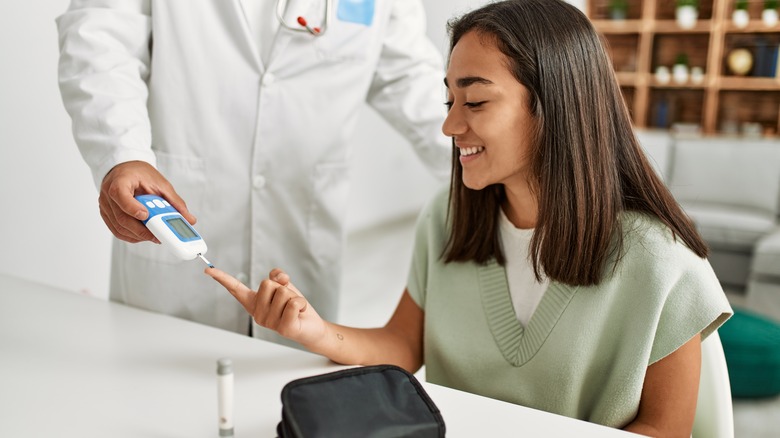Is There A Link Between Diabetes And Dizziness?
People affected with diabetes can display a wide variety of symptoms, including frequent urination at night, excessive thirst, fatigue, and weight loss without effort. The condition stems from the body's inability to produce insulin, which regulates the amount of sugar, or glucose, in your blood. Without insulin to release blood sugar into the body's cells, it will remain in your bloodstream, which could lead to a range of serious health issues. These might include kidney disease and problems with your vision.
The levels of glucose that remain in the blood as a result of diabetes can also lead to dizziness (via Family Medicine Austin). People who experience dizziness as a result of diabetes can feel lightheaded or confused. They can also feel unsteady on their feet and have a difficult time walking. In some cases, the dizziness can strike suddenly, causing the afflicted person to need to sit or lie down quickly.
Your blood sugar may be the cause
According to 2018 research published in Practical Diabetes, dizziness was a commonly-reported symptom of diabetes. The research found that 27% of patients with high blood sugar (hyperglycemia) reported feeling light-headed and 22% said that they felt dizzy. Up to 44% of patients with low blood sugar, or hypoglycemia also reported feeling dizzy. The Medical University of South Carolina also reported that anywhere between 10% and 40% of people over the age of 65 cite dizziness as a byproduct of their diabetes.
In addition to low or high blood sugar being a potential culprit for dizziness, dehydration can also be a possible cause. High blood sugar levels in people who are diabetic can lead to dehydration. As the kidneys attempt to filter out excess glucose in the body, they can also rid the body of water. The resultant dehydration can make a person feel dizzy.
Medical News Today also notes that the medications you're taking for your diabetes can be causing you to feel dizzy, especially medications that lower your blood sugar. Additionally, if you are taking statins, certain antibiotics, diuretics, or nonsteroidal anti-inflammatory drugs, you could experience dizziness. You could consult your doctor if you're experiencing any dizzy sensations while taking certain medications.
If you're feeling dizzy, see your doctor
If you are feeling dizzy as a result of diabetes, especially if it is happening frequently, you should talk to your doctor about treatment (via Family Medicine Austin). You should also adopt a healthy lifestyle and exercise routine, both of which can be helpful in keeping your diabetes better controlled. However, you should be aware that, in some cases, exercise can lead to a drop in blood sugar and subsequent dizziness.
If left untreated, dizziness caused by diabetes could be an indicator of more serious complications, such as ketoacidosis, which is an emergency condition requiring immediate attention. You should monitor your blood sugar regularly and, if it drops, doctors recommend following the 15:15 rule. This means that a person with low blood sugar should take 15 grams of a carbohydrate, then wait 15 minutes and check their levels again. Remaining vigilant about your blood sugar levels and communicative with your doctor will ensure that your diabetes-related dizziness does not have to become something more problematic.



